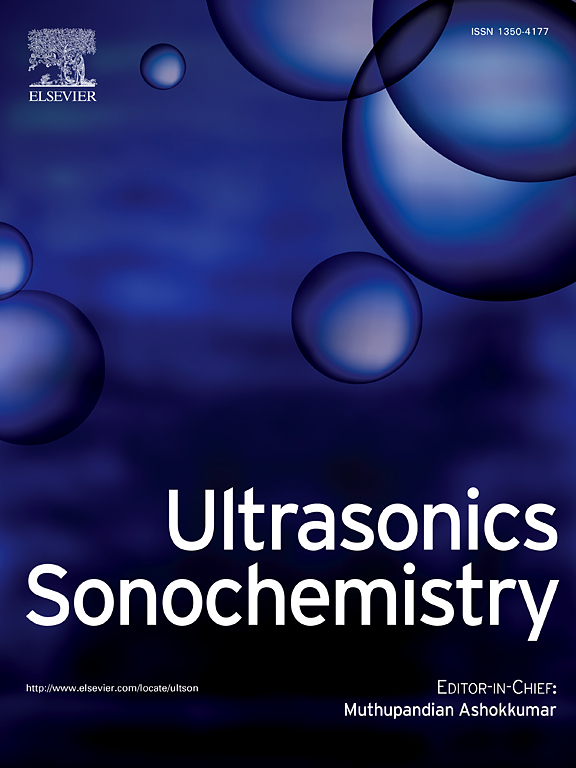Study on optimization of extraction and purification processes for total flavonoids from Lycopi herba roots and their anti-proliferative effects on fibrous synoviocytes in human rheumatoid arthritis
IF 8.7
1区 化学
Q1 ACOUSTICS
引用次数: 0
Abstract
Lycopi herba, a traditional Chinese medicinal plant, has long been valued for its aerial parts. however, its roots, which are often discarded as non-medicinal waste, actually contain flavonoid compounds that possess potential medicinal values such as anti-inflammatory, antioxidant, and anti-tumor activities. Despite this, studies on the extraction, purification, and biological activity assessment of total flavonoids from L. herba roots (TFLHR) remain inadequate. Our study aimed to optimize the extraction and purification processes for TFLHR and evaluate their anti-proliferative effects on human fibroblast-like synoviocytes (HFLS-RA), which are key pathological cells in rheumatoid arthritis. By utilizing ultrasound-assisted extraction combined with response surface methodology (RSM), we optimized the extraction conditions, achieving a total flavonoid content of 90.484 ± 0.974 mg/g under the optimal settings: a liquid–solid ratio of 48:1 mL/g, 13 min of ultrasound treatment, 70 % ethanol, and an extraction temperature of 43°C. Subsequently, macroporous resin chromatography was employed for flavonoid purification, with AB-8 resin exhibiting the highest performance, achieving adsorption and desorption rates of 79.64 ± 1.51 % and 88.61 ± 1.02 %, respectively. By further refining the purification conditions through RSM, the purity of flavonoids was increased to 63.9 ± 1.86 %. Through ultra performance liquid chromatography tandem-quadrupole time-of-flight tandem mass spectrometry (UPLC-Q-TOF-MS/MS) analysis, 74 flavonoid compounds across 15 categories were identified. Further activity studies demonstrated that purified TFLHR exhibited significant concentration-dependent anti-proliferative effects on HFLS-RA cells. This study not only provides a scientific basis for the comprehensive utilization of L. herba root resources but also highlights the potential medicinal value of TFLHR in the treatment of rheumatoid arthritis, laying a foundation for future research into its specific mechanisms and clinical applications.
从枸杞根中提取和纯化总黄酮及其对人类类风湿性关节炎纤维滑膜细胞抗增殖作用的优化工艺研究
枸杞是一种传统的中药植物,长期以来其气生部分一直受到人们的重视。然而,枸杞根(通常作为非药用废物丢弃)实际上含有黄酮类化合物,具有潜在的药用价值,如抗炎、抗氧化和抗肿瘤活性。尽管如此,有关茜草根(TFLHR)中总黄酮类化合物的提取、纯化和生物活性评估的研究仍然不足。我们的研究旨在优化 TFLHR 的提取和纯化过程,并评估其对类风湿关节炎的关键病理细胞--人成纤维细胞样滑膜细胞(HFLS-RA)的抗增殖作用。我们利用超声辅助萃取结合响应面方法(RSM)优化了萃取条件,在液固比48:1 mL/g、超声处理13分钟、70%乙醇、萃取温度43°C的最佳设置下,总黄酮含量达到90.484 ± 0.974 mg/g。随后,采用大孔树脂色谱法纯化黄酮类化合物,其中 AB-8 树脂的性能最高,吸附率和解吸率分别为 79.64 ± 1.51 % 和 88.61 ± 1.02 %。通过 RSM 进一步改进纯化条件,黄酮类化合物的纯度提高到 63.9 ± 1.86 %。通过超高效液相色谱-串联四极杆飞行时间串联质谱(UPLC-Q-TOF-MS/MS)分析,共鉴定出 15 个类别的 74 种黄酮类化合物。进一步的活性研究表明,纯化的 TFLHR 对 HFLS-RA 细胞具有显著的浓度依赖性抗增殖作用。这项研究不仅为枸杞根资源的综合利用提供了科学依据,而且凸显了TFLHR在治疗类风湿性关节炎方面的潜在药用价值,为今后研究其具体机制和临床应用奠定了基础。
本文章由计算机程序翻译,如有差异,请以英文原文为准。
求助全文
约1分钟内获得全文
求助全文
来源期刊

Ultrasonics Sonochemistry
化学-化学综合
CiteScore
15.80
自引率
11.90%
发文量
361
审稿时长
59 days
期刊介绍:
Ultrasonics Sonochemistry stands as a premier international journal dedicated to the publication of high-quality research articles primarily focusing on chemical reactions and reactors induced by ultrasonic waves, known as sonochemistry. Beyond chemical reactions, the journal also welcomes contributions related to cavitation-induced events and processing, including sonoluminescence, and the transformation of materials on chemical, physical, and biological levels.
Since its inception in 1994, Ultrasonics Sonochemistry has consistently maintained a top ranking in the "Acoustics" category, reflecting its esteemed reputation in the field. The journal publishes exceptional papers covering various areas of ultrasonics and sonochemistry. Its contributions are highly regarded by both academia and industry stakeholders, demonstrating its relevance and impact in advancing research and innovation.
 求助内容:
求助内容: 应助结果提醒方式:
应助结果提醒方式:


